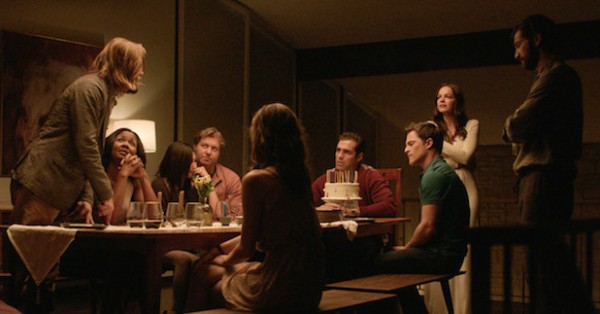
Courtesy of Drafthouse Films
The Invitation is a textbook example of how to create tension using actors and mise-en-scene.
Let’s bitch it out…
The Invitation is an interesting film because part of its appeal lies in not knowing where it is going. There’s a niche subgenre of horror films that operate by keeping their audiences in the dark for as long as possible, an approach that directly contradicts the approach of most films that begin with a murder or a backstory to cue viewers what they can expect. Here we’re closely aligned with our protagonist, grief-stricken Will (Logan Marshall-Green) and, to a lesser extent his new girlfriend Kira (Emayatzy Corinealdi), so whatever they know, we know. In this sense, The Invitation is a long character-based investigation film as we try to figure out what the hell is going on.
The plot is fairly lean: after two years of silence, Will receives a dinner party invitation from his ex-wife Eden (Tammy Blanchard) and her new husband David (Michiel Huisman). When he arrives at the house he used to share with Eden, Will is perturbed to find Eden and David acting strangely. All of his friends assure him that it should be expected after such a long absence and in the wake of the terrible tragedy they’re all still recovering from. But as the evening goes on and strange friends of the hosts arrive, the sense of unease and the tension increases, prompting Will – and us – to wonder if something more nefarious is going on.
The Invitation is a success because it treads this line very carefully. Director Karyn Kusama (famed for Girlfight, less so for Aeon Flux and Jennifer’s Body) and screenwriters Phil Hay and Matt Manfredi are careful not to tip their hats until the appropriate moment. We’re aligned with Will, so we share his suspicions, but we also recognize that he is so grief stricken that he may be an unreliable protagonist. Is he paranoid? He certainly acts distant and irrational, taking long breaks from the party to sit by the pool or stand on the terrace. Perhaps this is nothing more than his discomfort at being back in his wife’s presence and seeing how composed she is? Or it could be the fact that the hosts and their unannounced guests have joined a strange Mexican cult. Either/or.
This push and pull continues for the first two acts of the film and it’s here that The Invitation excels. The performances are all naturalistic and low-key, so it often feels like we’re privy to the intimate banter of long lost friends as they catch up. By restraining the action and the characters to a single (large) space – the house – for the majority of its runtime, the film oscillates between claustrophobia and intimacy depending on the needs of the plot at any given time. The house itself is as much a character as the actors: majestic and open in an extravagant sense, with enough decoration and memorabilia to avoid feeling cold or stilted. The addition of bars on the windows adds to the sense of danger.
Kusama is returning to her independent roots with this film and the confidence and assuredness in her directing confirms that her time as a studio mule hasn’t dampened her talent. Even with her less successful efforts, Kusama never wanted for mood or atmosphere and when the shit hits the proverbial fan in the final act, the payoff is effective in large part thanks to the strong direction and character work of the first acts. It’s good to have her back where she belongs.
Bottom Line: The Invitation is a great potboiler of a film, rich with character and atmosphere. You know you’re onto something special when a slap, a twist of a key or an after dinner toast can instil fear and dread.
The Invitation plays the Melbourne International Film Festival on August 7 and the Sidewalk Film Festival on August 29. I fully expect this film to get snapped up for wider release in the near future.